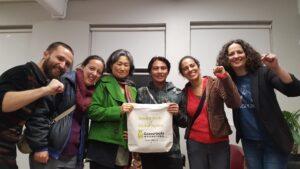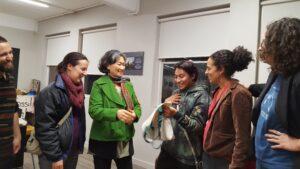Connecting the Local and Global: Lessons in Movement Building from Massachusetts to El Salvador
Communities in the U.S. and global movements share common lessons in organizing to address the root causes of injustice, and to put forward grassroots solutions. However, only rarely are these lessons shared in person.
Some 50 people got that opportunity in Chelsea, MA on November 8, joining local area activists and representatives from Mesoamerica’s unwavering social movements at “Lessons from the Grassroots of Honduras and El Salvador.”
The event brought together Gaspar Sánchez from COPINH (Civic Council of Popular and Indigenous Organizations of Honduras, a Grassroots International Partner), Norma Ramos from MPR-12 (Popular Resistance Movement from El Salvador), and leaders of local environmental justice organization GreenRoots in Chelsea. Grassroots International, GreenRoots, Witness for Peace and the Committee in Solidarity with the People of El Salvador (CISPES) sponsored the discussion amid rising right-wing repression and obstacles facing movements for land and social justice in the three locales.
The Deadliest Country in the World
In Honduras, the repression has been particularly vicious since the 2009 right-wing military coup. Global Witness has called it the “deadliest country in the world for environmental activism.” Since 2010 more than 120 activists have died campaigning against dams, mines and other mega projects.
In 2016, COPINH’s Berta Cáceres, a Goldman Environmental Prize winner and internationally revered environmental activist, was assassinated in her home by armed assailants. It was the final act in a weeks-long campaign of death threats against her, retribution for her organizing. She had led the struggle against the Agua Zarca hydroelectric dam that was threatening a river sacred to her Indigenous Lenca community.
“99% of the cases, hate crimes and violent deaths, are not being investigated,” Gaspar said.
Berta’s family and COPINH pushed for an independent inquiry following her murder. After a year on the case, an international team of lawyers from the United States, Colombia and Guatemala implicated dam development company executives in her assassination.
With Grassroots International’s support, Gaspar came to the U.S. to connect with social movements and to call upon members of Congress to back the Berta Cáceres Act. The law would cut off U.S. funding to the Honduran police and military until they cease to play a hand the deaths of environmental and human rights activists.
“We have to generate spaces where people can speak up. That’s part of why we’re here,” Gaspar said.
Other communities are also facing repression and increased abuse. In his talk, Gaspar wove the specific repression facing Indigenous activists into the overall picture of attacks on social rights – both before the coup and since then.
LGBTQ people in Honduras have faced attacks on Pride festivals, police harassment, and murders in their community. The climate has kept many LGBTQ people from being open and accepting of their own identities, making statistics on LGBTQ youth hard to collect.
At the same time, the coup government has attacked workers’ rights, expanding temporary contract labor through its 2010 labor law. Honduran employers can hire workers under short-term contracts as brief as two hours a day, and workers in their special export processing zones make the lowest wages in Central America.
The struggle we have is regional, and the U.S. government has always seen it that way,” Norma said. “We’re not just El Salvador. They’re not just Honduras. We’re together. We’re the resistance.
Yet amid repression, there are signs of hope. COPINH continues to bravely organize alongside other social movements in Honduras.
COPINH and OFRANEH (Black Fraternal Organization of Honduras, another Grassroots International partner) have worked together on Indigenous rights. And as COPINH’s Sexual Diversity and Rights Equality coordinator, Gaspar has helped to make it the first Indigenous organization in Latin America to champion LGBTQ issues.
“We continue saying what Berta used to say all the time, ‘that we can’t wage isolated struggles,’” Gaspar told Witness for Peace’s Bryan Rogers in a recent interview.
El Salvador Bans Metal Mining
Mining corporations have dumped cyanide and iron compounds into Salvadoran rivers for decades. As a result, more than 90 percent of the country’s surface water remains contaminated today.
But even after a decade-long civil war and amid continued American interference, a years-long bottom-up struggle was able to win a historic victory. Earlier this year El Salvador became the first country in the world to impose a ban on metal mining.
Norma Ramos of MPR-12 lauded the progressive President Salvador Sánchez Cerén, but emphasized that the victory came from the grassroots.
“It wasn’t just there was a progressive government, there was a grassroots struggle,” Norma said. “It’s not enough to just have a progressive government in power. What followed was a great struggle that was finally won in 2016.”
Connections to the U.S.
Members of GreenRoots connected the struggles in Latin America with local campaigns for environmental justice in Chelsea. The city has one of the highest rates of asthma in the state, and GreenRoots has organized to hold polluters accountable.
“There’s an intersection between race, class, and the environment. That’s where we fight,” Indira Garmendia Alfaro of GreenRoots said.
Speakers continued to emphasize how important international solidarity and grassroots struggle will be important for social movements here and around the world.


“We have to create a base, a grassroots movement because we don’t know when the next struggle will be,” said María Belén Power, the Associate Executive Director of GreenRoots. “It’s important for us to be ready and organized.”
“The struggle we have is regional, and the U.S. government has always seen it that way,” Norma said. “We’re not just El Salvador. They’re not just Honduras. We’re together. We’re the resistance.”


